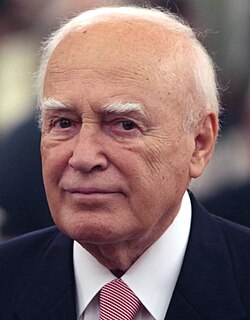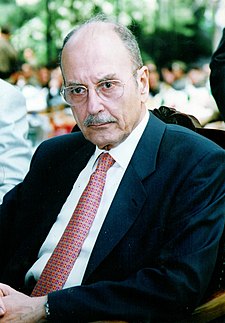Ioannis Grivas was a Greek judge, who served as President of the Court of Cassation and served as the Prime Minister of Greece at the head of a non-party caretaker government in 1989.

Prokopios Pavlopoulos, GColIH, commonly shortened to Prokopis (Προκόπης), is the current President of Greece, in office since 2015. A lawyer, university professor and politician, he was Minister for the Interior from 2004 to 2009.
The Greek football PSAP awards are a number of awards given annually by the Greek Union of Professional Football Players (PSAP). These awards are given annually to players playing in the Superleague Greece, Football League and Football League 2. Managers and referees are also awarded by the PSAP on an annual basis.
Georgios Papoulias was a Greek politician and diplomat. Papoulias briefly served as the Foreign Minister of Greece on two separate terms in 1989 and 1990.

The May 2012 Greek legislative election was held in Greece on Sunday, 6 May, to elect all 300 members to the Hellenic Parliament. Under the constitution, it was due to be held in late 2013, four years after the previous election; however, an early election was agreed under the November 2011 agreement to form a coalition government, formed with a remit to ratify and implement decisions taken with other Eurozone countries and the International Monetary Fund (IMF) a month earlier.

The June 2012 Greek legislative election was held in Greece on Sunday, 17 June, to elect all 300 members to the Hellenic Parliament in accordance with the constitution, after all attempts to form a new government failed following the May election. If all attempts to form a new government fails, the constitution directs the president to dissolve a newly elected parliament, and then to call for new parliamentary elections within 30 days of the dissolution. The president announced at 16 May the date for the new election, and signed the formal decree to dissolve the parliament and call for the election at 19 May.
The Greek government formation of May 2012 was a series of failed attempts to form a new government after the legislative election in May 2012 by the three largest parties: New Democracy (centre-right), Coalition of the Radical Left and Panhellenic Socialist Movement, respectively, and then followed by the President of Greece. After the negotiations led by the president had failed on 15 May, a temporary caretaker cabinet under Council of State president Panagiotis Pikrammenos was appointed on 16 May, and a new election was set for 17 June.

The January 2015 Greek legislative election was held in Greece on Sunday, 25 January, to elect all 300 members to the Hellenic Parliament in accordance with the constitution. The election was held earlier than scheduled due to the failure of the Greek parliament to elect a new president on 29 December 2014.

Greece–Nicaragua relations are foreign relations between Greece and Nicaragua. Diplomatic relations were officially established on 2 July 1965. Greece is represented in Nicaragua through its embassy in Mexico City. Nicaragua is represented in Greece through its embassy in Rome.
The 2014–15 Cypriot Cup was the 73rd edition of the Cypriot Cup. A total of 26 clubs entered the competition. It began on 29 October 2014 with the first round and concluded on 20 May 2015 with the final which was held at GSZ Stadium. APOEL clinched their 21st Cypriot Cup trophy and their second in successive seasons with a convincing 4–2 victory over AEL Limassol.

Indirect presidential elections were held in Greece in December 2014 and February 2015 for the succession to Karolos Papoulias as the President of Greece. The candidate of the ND–PASOK government, Stavros Dimas, failed to secure the required majority of MPs of the Hellenic Parliament in the first three rounds of voting in December. According to the provisions of the Greek Constitution, snap elections were held on 25 January 2015, which were won by the far-left SYRIZA party. Following the convening of the new parliament, the presidential election resumed, and on 18 February 2015, veteran ND politician Prokopis Pavlopoulos, backed by the SYRIZA-ANEL coalition government, was elected with 233 votes.

An indirect election for the position of President of the Hellenic Republic was held by the Hellenic Parliament on 8 February 2005.

An indirect election for the position of President of the Hellenic Republic was held by the Hellenic Parliament in 1995.
The following lists events that happened during 2015 in Greece.

An indirect election for the position of President of the Hellenic Republic was held by the Hellenic Parliament in April–May 1980.

The anti-austerity movement in Greece involves a series of demonstrations and general strikes that took place across the country. The events, which began on 5 May 2010, were provoked by plans to cut public spending and raise taxes as austerity measures in exchange for a €110 billion bail-out, aimed at solving the Greek government-debt crisis. Three people were killed on 5 May in one of the largest demonstrations in Greece since 1973.

The 2019 Greek legislative election will be held on or before 20 October 2019, in accordance with the Constitution of Greece. At stake will be all 300 seats in the Hellenic Parliament. Unless an early election is called before that date, it will be the first parliamentary session since the 2004 election which exhausted the parliamentary mandate of the previous election. It will be the first national election in Greece where the voting age will be lowered to 17, and the number of parliamentary constituencies was increased from 56 to 59. Athens B, the largest constituency with 44 seats before the 2018 reform, was broken up into smaller constituencies, the largest of which has 18 seats.
The order of precedence of Greece is fixed by the Decree 52749/2006 of the Minister of the Interior, and prescribes the protocollary hierarchy of the Greek political leadership. The President, as head of state, is first, and the Prime Minister, as head of government, is second.
- President of Greece
- Prime Minister of Greece
- Speaker of the Hellenic Parliament
- Archbishop of Athens and All Greece
- Leader of the Official Opposition
- Former President(s) of Greece
- Vice President(s) of the Government














